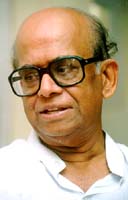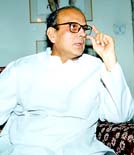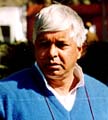The Rediff Interview/Era Sezhiyan
'Narasimha thinks, thinks and thinks but never decides; Deve Gowda decides everything first and thinks later!'
 When Era Sezhiyan,one of the founders
of the Janata Dal, decided to part ways with the party, people
began to smell trouble. He was one of the members of the organising
committee set up by Jayaprakash Narayan which went on to establish
the Janata Party. When the Janata Party was transformed
into the Janata Dal in 1988, he became a founder member of that party too.
When Era Sezhiyan,one of the founders
of the Janata Dal, decided to part ways with the party, people
began to smell trouble. He was one of the members of the organising
committee set up by Jayaprakash Narayan which went on to establish
the Janata Party. When the Janata Party was transformed
into the Janata Dal in 1988, he became a founder member of that party too.
After Shobha Warrier's hour-long talk with the septuagenarian at his sprawling
bungalow on Greenways Road, Madras, one got the impression that he belongs
to a different era, an era where politicians believed in ideology,
integrity and honesty. He never occupied any office when the
party was in power, but was an important member of the party
hierarchy. He says he was offered ambassadorships and governorships
when the Janata Dal was in power, but refused all those "ornamental posts."
He believes that "if you go to a state as a governor, you should not
come back to active politics. We attacked the institution of governor
as a tool in the hands of the central government to disturb
and destabilise state governments, so my principle did not let
me accept the post."
In the statement you issued after your resignation from the
Janata Dal, you compared your party to a rudderless ship
swaying on both sides. What made you say that?
I have felt it for long and a stage came when I had to say these
things in the open. I could not bear the deterioration that was taking
place. Not only in the Janata Dal, but in the entire political
system in India. There is a general deterioration of which the
Janata Dal is no exception.
By deterioration, do you mean a lack of proper leadership or
leaders?
(It is the lack of) proper functioning of the party on democratic
principles for which the party is created or supposed to function.
For example, take my party. If you look at the purpose for which
the party was created you will understand. During the Emergency,democratic rights were suppressed, the press was
gagged and everything happened that can happen only in a despotic
State. Therefore, the Janata movement was born to liberate India
and restore democratic values.
You win elections, you lose elections. But a stage has reached
where we have forgotten for what purpose we are functioning as
a party.
When did you first start feeling disillusioned?
In 1992.
Who could be responsible for the deterioration in the party?
I take responsibility for it. Because I was a top
leader. I was in charge of the campaign committee. After the elections,
I insisted that the party should reorganise itself on a democratic
basis. Nothing happened. As long as the Janata Party was there,
we had regular party elections. To a certain extent, the party
was functioning as per the rules and regulations. But after the
formation of the Janata Dal in 1988, the general elections came in
1989 and everything became ad hoc.
 On an ad hoc basis, committees were
formed and V P Singh became the leader. After the fall of the
JD government, I insisted that we have party elections. V P Singh did one
good thing. He said we should have a party organisation. So,
in 1992 apart from the national executive which has 80 members
or so, we formed what they called a political affairs committee.
It is a committee constituted by the party president and is the highest
policy making body in the party.
On an ad hoc basis, committees were
formed and V P Singh became the leader. After the fall of the
JD government, I insisted that we have party elections. V P Singh did one
good thing. He said we should have a party organisation. So,
in 1992 apart from the national executive which has 80 members
or so, we formed what they called a political affairs committee.
It is a committee constituted by the party president and is the highest
policy making body in the party.
I was a member and at one of the meetings held
in 1992 we decided to have organisational elections, and
they made me in charge of it. In fact, I was
in charge of all the elections from top
to bottom. I said then itself that if they do not co-operate
and the elections were not conducted in time, I would not stick
to the post, I would resign.
Finally we agreed that by the 9th
of June 1993, all the elections up to the state level would be
over and within a month we could have national elections.
But only 7 out of the 25 states completed the elections,
others did not. Even in Bihar and Orissa, where we had state governments,
we refused to hold elections within the party.
Is it because the leaders were afraid of holding elections?
They were not scared, I think. They asked, what is the need.
I am the chief minister, I am doing everything and why do you
want another boss here?
But you are the people who criticise the Congress for not
holding intra-party elections.
That is exactly what I said. We criticise other parties,
but we make the same mistake. What moral authority do I then have
to go to the people and say that some other party does not have
a democratic set-up? How can I say that?
How did the other party leaders react to your suggestion about holding
intra-party elections?
They didn't say 'no' to me,
but they didn't do what they themselves assured me. I said, these
two states (Bihar and Orissa) are guilty of not following the
rudimentary aspect of conducting elections. I can understand
the other states. There was a change in the government in Karnataka,
there was a leadership change in Tamil Nadu. These two other states
where we have a base, where we have come to power, did not hold
organisation elections.
 So, your dissatisfaction and disagreement was mainly with Laloo
Prasad Yadav and Biju Patnaik.
So, your dissatisfaction and disagreement was mainly with Laloo
Prasad Yadav and Biju Patnaik.
Chiefly, But all the others did not have elections too. Then
I said, this won't do - and resigned from the post two days after
the target date.
Had any other leader been there at the helm of affairs, for
example V P Singh, would it have made any difference?
Earlier, I had worked with Morarji Desai when he was prime
minister. Chandra Shekhar was there. We all agreed and we functioned
smoothly. Some differences were there, but this - not having your
own party in order, and then calling your party a democratic party
- did not happen then. The leaders were within the party, now
the party is within the leaders or under the leaders. That sort
of a change has taken place.
Is it because you have too many leaders now?
Maybe, maybe. That may be one of the reasons. But there is a metamorphosis of
political functioning
itself. Previously also, (in the Congress), there were dissensions
and difference of opinions among the leaders, but it all happened
within the party whether it be Nehru or Patel or Seetharamaiah.
Then the party tolerated so many leaders.
Then a stage came when
the leader became the party. Slowly, the party started moving along
with the leader, not the other way round. Gandhiji and others
were dominant figures in the party, but they discussed. Decisions
were taken after debates. There were people who said, we do not
agree with Nehru. After Mrs Gandhi's adventure in 1969, the party
got deinstitutionalised. Then it became personality-oriented.
As far as my party is concerned, there should be co-operation
among the leaders. Who is the number one, number two is not
the question, but all the others should help the number one to
function.
Photographs: Era Sezhiyan by D Sanjay
|





 When Era Sezhiyan,one of the founders
of the Janata Dal, decided to part ways with the party, people
began to smell trouble. He was one of the members of the organising
committee set up by Jayaprakash Narayan which went on to establish
the Janata Party. When the Janata Party was transformed
into the Janata Dal in 1988, he became a founder member of that party too.
When Era Sezhiyan,one of the founders
of the Janata Dal, decided to part ways with the party, people
began to smell trouble. He was one of the members of the organising
committee set up by Jayaprakash Narayan which went on to establish
the Janata Party. When the Janata Party was transformed
into the Janata Dal in 1988, he became a founder member of that party too.
 On an ad hoc basis, committees were
formed and V P Singh became the leader. After the fall of the
JD government, I insisted that we have party elections. V P Singh did one
good thing. He said we should have a party organisation. So,
in 1992 apart from the national executive which has 80 members
or so, we formed what they called a political affairs committee.
It is a committee constituted by the party president and is the highest
policy making body in the party.
On an ad hoc basis, committees were
formed and V P Singh became the leader. After the fall of the
JD government, I insisted that we have party elections. V P Singh did one
good thing. He said we should have a party organisation. So,
in 1992 apart from the national executive which has 80 members
or so, we formed what they called a political affairs committee.
It is a committee constituted by the party president and is the highest
policy making body in the party.
 So, your dissatisfaction and disagreement was mainly with Laloo
Prasad Yadav and Biju Patnaik.
So, your dissatisfaction and disagreement was mainly with Laloo
Prasad Yadav and Biju Patnaik.